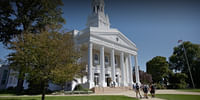The College's?expansive history curriculum?spans a wide range of periods and developments in the Western and non-Western worlds --from the Age of Discovery in the 15th century to the changing relationship between the United States and the Middle East, from the medieval era to today.
Coursework in history takes place both?in and outside the classroom, via classes, research, faculty/student collaboration, and hands-on fieldwork.
Comparing different parts of the world at different periods of time offers insight into the diversity of the human experience as well as one's own place in the world. It is through this process of discovery that the study of history sharpens the mind and leads students toward what can become a lifetime of informed citizenship.
Students will demonstrate . . .
- a basic knowledge of global history and broad geographical area content.
- the ability to analyze and contextualize primary sources.
- an awareness of information literacy and the ability to conduct research in a variety of sources both primary and secondary.
- the ability to understand the variety of methodologies in contemporary historical practice and to participate in historiographical conversations through critical reading, writing, and discussion.
- the ability to develop and defend a coherent argument verbally and in writing.
- the ability to research and write a senior thesis using the conventions of the discipline.












